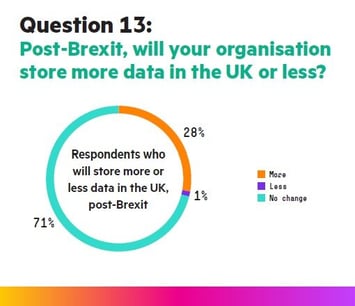
New research has revealed the extent to which public sector agencies in the UK are holding data with no plans ever to delete it.
The House of Data research report, conducted by Hewlett Packard Enterprise, used FOI requests to ask Civil Service leaders about a range of issues around their data collection and handling. “Our research suggests that data hoarding is increasingly becoming the default. Be it fear of deleting, the hope it delivers value in the future or policy requirements,” the report reveals.
When asked “What is the maximum period you would hold data for?”, 49% of UK public sector respondents said they will hold their data permanently. “If doing so on the public cloud (including redundant, uncategorised or obsolete dark data), this is likely to be expensive,” the report adds.
Among the other findings in the analysis of Government data storage are:
- 28% of all UK public sector organisations say they will be storing more data in the UK post-Brexit.
- 83% of respondents say data security is the top priority in creating their data storage strategies.
- The second most important consideration in storage strategies is Data sovereignty.
Russell Macdonald Chief Technology Officer for Public Sector at Hewlett Packard Enterprise says the public sector needs to consider the financial impact of data inefficiency: “There is a need to think judiciously about data and whether we are storing data in the most efficient way. Are we avoiding unnecessary duplication, unnecessary data traffic because that all has a monetary and a carbon cost.”
The report suggests a rethink is needed around data storage strategies in the public sector:
“The cost of storing all data for ever-extending periods of time will be significant. In past decades, paper records would be archived in bulk storage warehouses and computer tapes would be used for cost-effective long-term storage. However, to analyse data over long periods of time, it needs to be available digitally.
“And if we’re to derive value from it, analysis is required – doubling, tripling data sets, storing back-ups, perpetuating data growth. The culture around data storage requires attention and discussion.”








